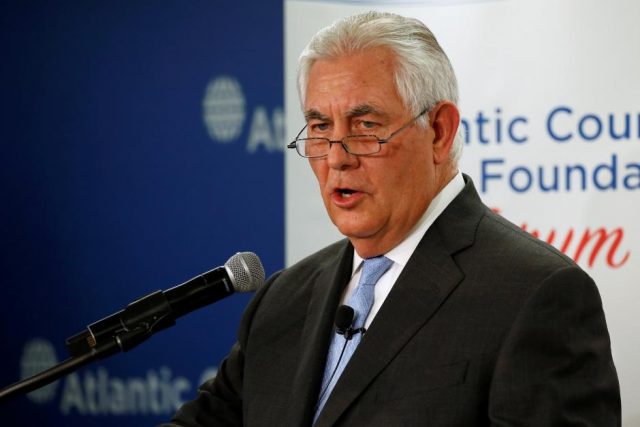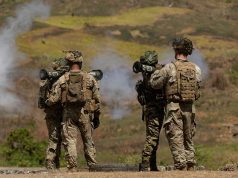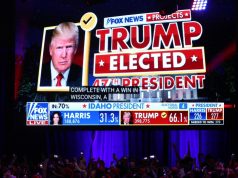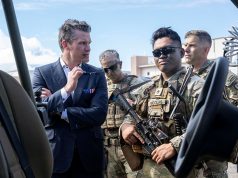
WASHINGTON — U.S. Secretary of State Rex Tillerson offered on Tuesday to begin direct talks with North Korea without preconditions, backing away from a key U.S. demand that Pyongyang must first accept that any negotiations would have to be about giving up its nuclear arsenal.
“Let’s just meet,” Tillerson told Washington’s Atlantic Council think tank, presenting a new diplomatic overture amid heightened tensions over North Korea’s nuclear and missile advances and harsh rhetoric between the two sides.
The White House later issued an ambiguous statement that left unclear whether President Donald Trump – who has said in the past that Tillerson was wasting his time pursuing dialogue with North Korea – had given his approval for the speech.
“The president’s views on North Korea have not changed,” the White House said. “North Korea is acting in an unsafe way … North Korea’s actions are not good for anyone and certainly not good for North Korea.”
The apparent shift in Tillerson’s thinking came nearly two weeks after North Korea said it had successfully tested a new intercontinental ballistic missile in what it called a “breakthrough” that put the United States mainland within range.
While reiterating that Washington cannot accept a nuclear-armed North Korea, Tillerson said the United States was “ready to talk any time they’re ready to talk.” But he insisted there would have to be a “period of quiet” without nuclear and missile tests to have productive discussions.
At the United Nations, a senior U.N. official said after returning from a visit to North Korea that senior North Korean officials had not offered any commitment to talks when he was there last week, but he believed he left “the door ajar.”
U.N. political affairs chief Jeffrey Feltman, a former U.S. State Department official, was the highest-level U.N. official to visit North Korea since 2011 and met with Foreign Minister Ri Yong Ho and Vice Minister Pak Myong Guk during a four-day visit he called “the most important mission I have ever undertaken.”
“Time will tell what was the impact of our discussions, but I think we have left the door ajar and I fervently hope that the door to a negotiated solution will now be opened wide,” Feltman told reporters after briefing the U.N. Security Council behind closed doors on his visit.
“They need time to digest and consider how they will respond to our message,” he said.
In his remarks, Tillerson also disclosed that the United States had been talking to China about how to secure North Korea’s nuclear weapons in the event of a collapse of the government in Pyongyang. Washington had given Beijing assurances that if U.S. forces ever had to cross into North Korea they would not stay there and would return across the border into South Korea.
But he made clear that the United States wants to resolve the North Korea standoff through peaceful diplomacy, and in terms far more tempered than Trump’s recent threats against Pyongyang, offered to hold exploratory talks.
“We can talk about the weather if you want. We can talk about whether it’s going to be a square table or a round table,” Tillerson said.
“Then we can begin to lay out a map, a road map, of what we might be willing to work towards,” Tillerson said, suggesting that any initial contacts would be about setting the ground rules for formal negotiations.
Trump‘s backing?
Tillerson — whose influence has appeared to wane within the administration — said in his speech that Trump “has encouraged our diplomatic efforts.”
Trump, however, tweeted in October that Tillerson was “wasting his time trying to negotiate with Little Rocket Man,” using his derisive nickname for North Korean leader Kim Jong Un.
North Korea, for its part, has made clear that it has little interest in negotiations with the United States until it has developed the ability to hit the U.S. mainland with a nuclear-tipped missile, something most experts say it has still not achieved.
“We’re ready to have the first meeting without preconditions,” Tillerson said.
“It’s not realistic to say we’re only going to talk if you come to the table ready to give up your program,” he said. “They have too much invested in it. The president is very realistic about that as well.”
Tillerson’s comments appeared to deviate from previous statements by senior U.S. officials that North Korea would have to show it is serious about discussing nuclear disarmament before formal talks could begin.
Tillerson also said the United States was working to tighten enforcement of international sanctions against North Korea, especially further measures that China can apply, and that Washington had a full menu of military options if such a response is needed.
“It is important that the diplomatic effort be backed up with a very credible military alternative,” he said, adding that Trump “intends to make sure that they do not have a deliverable nuclear weapon to the shores of the United States.”
Tillerson called on North Korea to show restraint.
“It’s going to be tough to talk if in the middle of our talks you decided to test another device,” he said.
Tillerson said there were other uncertainties, given that “we are dealing with a new leader in North Korea that no one ever engaged with.
“He clearly is not like his father, nor is he like his grandfather,” he said, referring to North Korea’s last two leaders.
Daryl Kimball, executive director of the non-partisan Arms Control Association, said Tillerson’s proposal was overdue but that “in order to get to such talks going, the U.S. side as well as North Korea must demonstrate more restraint.”









